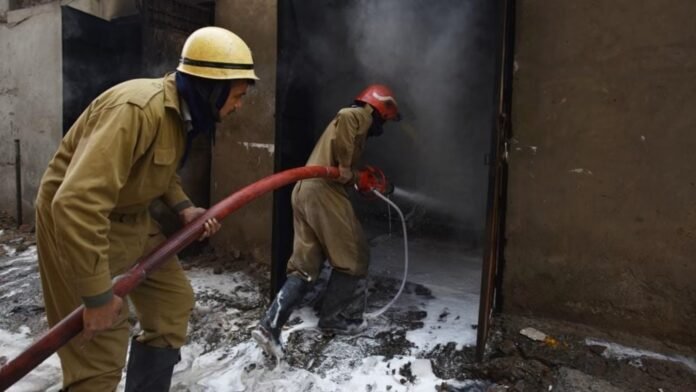An explosion at a pharmaceutical plant in Andhra Pradesh has claimed the lives of 16 workers and left 30 others injured. The blast occurred late Tuesday night at a chemical manufacturing unit in the Srikakulam district, known for housing several major pharmaceutical factories. The explosion was reportedly caused by a chemical reaction during a production process, leading to a devastating fire that engulfed the plant, trapping workers inside.
According to initial reports, the explosion occurred at a plant owned by a prominent pharmaceutical company, which specializes in the production of bulk drugs and chemical intermediates. The explosion, which shook the nearby residential areas, was followed by a massive fire that spread rapidly through the plant’s production facility. Firefighters and rescue teams rushed to the scene but struggled to contain the blaze, which raged for several hours.
The Blast and Immediate Aftermath
Eyewitnesses reported hearing a loud blast, followed by thick plumes of smoke rising from the plant. Workers at the site described scenes of chaos, with many attempting to flee the burning facility amid intense heat and toxic fumes. Local residents, who live near the industrial complex, said they felt the ground shake from the force of the explosion, with windows and doors rattling in nearby homes. Some residents initially feared an earthquake before realizing the source of the blast.
Authorities were alerted immediately, and fire brigades, police, and disaster response teams arrived on the scene to initiate rescue operations. However, the intensity of the fire and the presence of hazardous chemicals inside the plant complicated their efforts. Several workers were trapped inside the facility, and it took hours for the fire to be brought under control.
Among the dead were plant workers who were on the night shift, many of whom were caught off guard by the explosion and unable to escape. The injured, some with severe burns and others suffering from inhalation of toxic gases, were rushed to nearby hospitals for treatment. Many remain in critical condition, and doctors have warned that the death toll could rise further.
Cause of the Explosion
While the exact cause of the explosion is still under investigation, initial reports suggest that a chemical reaction went out of control during the manufacturing process, leading to the blast. The plant was reportedly engaged in the production of intermediates used in drug manufacturing at the time of the incident. Chemical manufacturing plants are often highly volatile environments, where strict adherence to safety protocols is crucial to preventing such disasters.
Local authorities and experts from the Directorate of Industrial Safety are now conducting a detailed probe to determine the precise cause of the explosion and whether any lapses in safety protocols were responsible. The plant has been sealed off, and a forensic team is expected to examine the site once it has been fully cleared of debris.
Government Response and Investigation
The Andhra Pradesh government has expressed its deep condolences to the families of the victims and has announced an ex-gratia payment of ₹10 lakh to the next of kin of the deceased. The injured will receive ₹2 lakh, while those with severe injuries will be provided free medical treatment at state-run hospitals. Chief Minister Y. S. Jagan Mohan Reddy condemned the incident and ordered a high-level inquiry into the matter.
In a statement, the Chief Minister emphasized the need to ensure that all safety standards and regulations are followed at industrial plants, particularly those dealing with hazardous chemicals. He urged the authorities to expedite the investigation and hold accountable any parties responsible for the tragedy.
The explosion has raised serious concerns about safety in India’s chemical and pharmaceutical industries, particularly in Andhra Pradesh, which is home to numerous such plants. Over the years, the state has seen several industrial accidents, often attributed to lapses in safety standards or human error. This latest incident has reignited calls for stricter enforcement of safety regulations and better monitoring of industrial facilities.
Calls for Action
Labor unions and industrial safety activists have condemned the lack of stringent safety protocols at such plants, citing the high-risk nature of the industry. They have called on both the state and central governments to implement stricter regulations to prevent such accidents from occurring in the future. Many activists argue that industrial disasters like this one reflect a broader pattern of negligence when it comes to worker safety in India’s industrial sectors.
The explosion at the Andhra Pradesh pharma plant is a stark reminder of the dangers inherent in chemical manufacturing and the devastating consequences when safety measures fail. As the investigation into the cause of the blast continues, the focus is now on ensuring that the victims receive justice and that future industrial accidents are prevented through stricter enforcement of safety standards.
For now, the industrial town of Srikakulam is in mourning, as families of the victims await answers and the injured continue their fight for survival in local hospitals.

